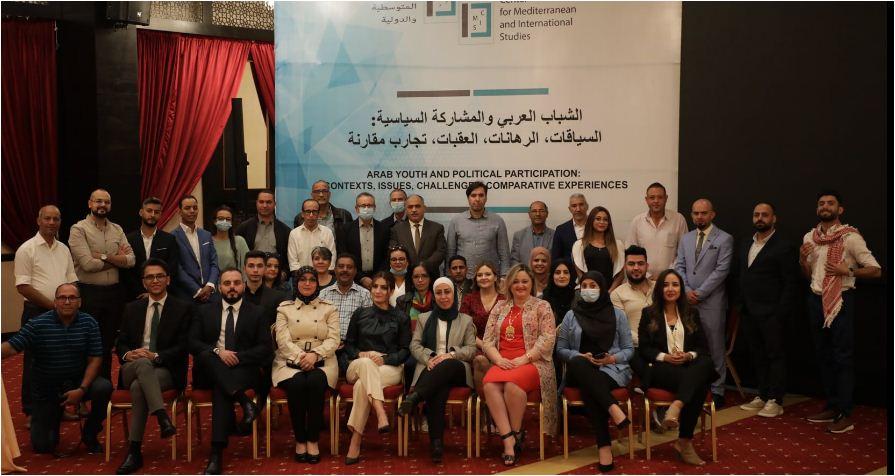Activités Récentes
YOUTH AND POLITICAL PARTICIPATION: CONTEXTS, CHALLENGES, OBSTACLES ;
The seminar which was organized on October 15 and 16, was attended by university researchers, experts, a group of young participants from civil society and political parties from Mauritania, Morocco, Algeria, Tunisia, Iraq, Jordan and Libya.
The seminar dealt with and analyzed the problem of the political participation of Arab youth in public affairs, its legal and political contexts, the total challenges this participation raises as a practice that have to be rooted. The seminar analyzed the total organizational, legal, cultural and educational obstacles that limit or reduce the size of this participation, and what are the factors that interfere with the perpetuation of this participation and those that interfere in its erosion, such as unemployment, marginalization, vulnerability and exclusion.
The seminar dealt also with the relationship of political participation with intermediary social institutions such as the family, university, school, party, and civil organization, and the overlap of participation in the democratic process to succeed the democratic transition.
The dissemination of this participation as a cultural value contributes to promoting participative practices and voluntary involvement in societal affairs, and its importance as an indispensable cornerstone for building citizenship and fortifying democratic gains.
On the sidelines of the seminar, a “youth workshop” was held on the vision / perception of the political and civil active youth on the issue of participation, its frameworks, obstacles and prospects. The workshop was attended by the youth of the Arab countries participating in the seminar from Iraq, Jordan, Libya, Tunisia and Morocco. The youth exchanged among themselves all the local contexts for the experience of political participation, and exchanged their personal experiences and expertise in the field.
- Conclusions and lessons learned :
It became clear through the work of the seminar and the various discussions that followed the sessions the following conclusions :
- Youth participation in political affairs is still not rooted as a daily practice. This participation is still stumbling and does not satisfy the youth at the level of party work, and it seems incomplete at the level of civil organizations. In both cases, young people still do not participate in an organized way or in a horizontal, vertical and permanent way in decision- making, drawing strategies, setting goals and formulating media discourse
- At the level of public policies and state strategies oriented at youth affairs, participation does not receive special attention and is not one of the prior issues for these policy-makers and official decision-makers. The state is still monopolizing these policies and invests politically in them, which made it unable to take an actual interest in the real issues of youth, whether economic, social or political. Participation is not a cornerstone of a national, social, political project that the state seeks to build in cooperation with other social actors. Rather, the question is raised about the very existence of this project.
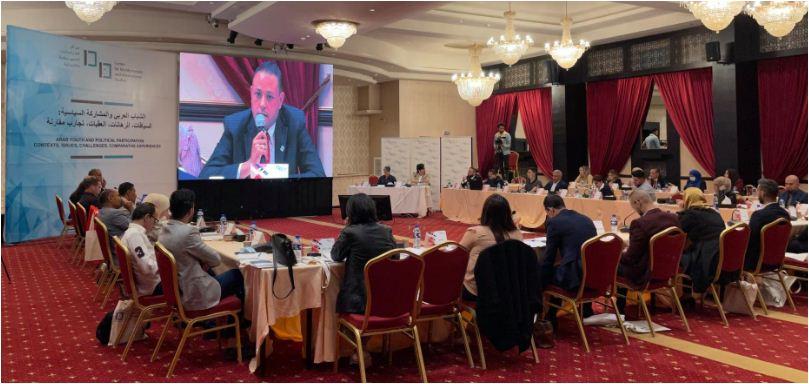
- The researchers present at the symposium unanimously agreed on the decline in the political participation of young people and its limitation in most cases to participation in elections. In fact, the various indicators show the growing reluctance of young people even from this kind of participation. The researchers considered that the decline in participation and the reluctance of young people are indicators of a political, social, mental and behavioral estrangement / rupture , which is going to expand, between young people on the one hand, and the state and political elites on the other.
- This rupture establishes a rift that will deepen unless public policies and the activity of parties and civil society are oriented in the direction of taking practical measures and drawing appropriate programs to reduce the decline in youth participation and face its severe effects that impact the entire political process and threaten the democratic process.
Recommendations
In this direction, university researchers participating in the work of the seminar and the youth of parties and civil society participating in the workshop presented the following proposals/ recommendations:
- The necessity :
-to review public policies oriented to youth in terms of their content, strategies, plans, objectives and mobilized resources; in the direction of making political and societal
participation a primary goal, and working on issues of education and culture due to their effects and returns on consolidating the values of participation, cooperation and volunteerism among children, youth.
-To work in order to make autonomy, management capabilities, criticism and suggestion part of the youth personality. the necessity of real listening to the youth and their effective participation in controlling the public policy options directed to them.
- The importance for parties and civil organizations to work on renewing their forms of work, consolidating the culture of participation within them, devising renewable and flexible mobilization methods, and adopting modern technologies as one of the important entrances to the dynamism and permanence of party political action. In addition, civil parties and organizations must work to open the horizons of leadership and decision on an equal basis for young people and break with the hegemonic, patriarchal culture in the direction of establishing gender rights as full and tangible human rights in daily partisan and civic practices, and open real horizons for the rotation of feminist elites.
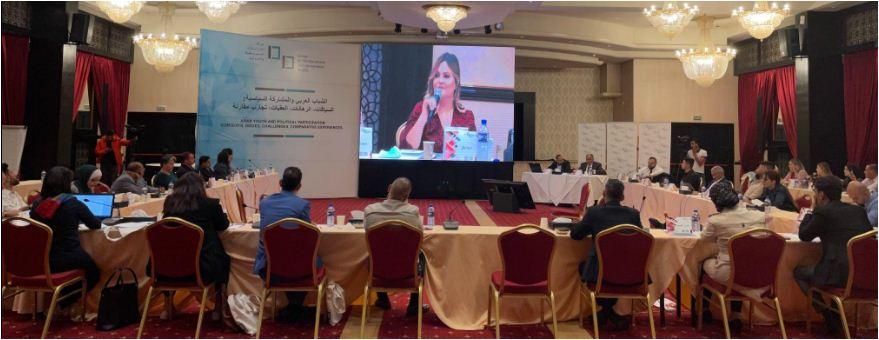
- Encouraging the openness of the political and civil society to the university elites in order to keep pace with the social transformations of the youth group, and to identify their real interests, the type of aspirations, what their demands and their patterns of cultural orientations. From this angle, it is important for political actors to push in the direction of intensifying the meetings of the youth of the Arab world to exchange experiences, develop various skills, facilitate networking and support interaction and communication in order to break the isolation imposed by geographical and political borders
Séminaire Régional
« La Participation de la Femme à la Vie Politique »
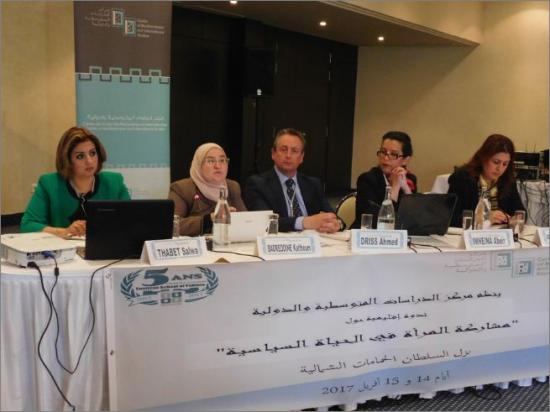
Le Centre des Etudes Méditerranéennes et Internationales a organisé les 14 et 15 Avril 2017 à Hammamet, un Séminaire Régional intitulé « La participation de la femme à la vie politique »
Ce séminaire régional qui se tient annuellement était dédié, dns sa version de 2017, à traiter l’impact du rôle des femmes dans la vie politique par le biais de différentes communications et présentations de la part des professeurs universitaires, des activistes de la société civile, des députés invités de plusieurs pays de la région (L’Algérie, le Maroc, l’Égypte, la Libye, et la Tunisie). Encore, de faciliter l’échange des connaissances ainsi que des expériences et de compiler différents types de données et statistiques pour développer des stratégies conjointes sur les manières de faire progresser le leadership des femmes dans le processus politique.
D’un point de vue général, ce séminaire régional vise à progresser le statut de la femme, dans le but de consolider et de dynamiser son rôle.
Aux prémices du premier jour, le directeur du centre des études méditerranéennes et internationales Ahmed Driss a accueilli l’assistance présente, prélude des deux jours de travaux qui seront réparties en trois grands axes qui mettront en lumière les objectifs de ce séminaire régional.
La représentation de la femme au sein des assemblés législatifs et son accès aux postes ministériels et gouvernementaux, comme premier axe, fut mené par plusieurs communications qui ne dissertaient pas uniquement sur l’équivoque de la participation de la femme dans les assemblés: ANC, ARP, et assemblés locales, mais également sur les différentes contrariétés qu’elles rencontrent. Et aussi la parité avec l’homme et la lutte contre la discrimination en incitant à un partage paritaire dans la société.
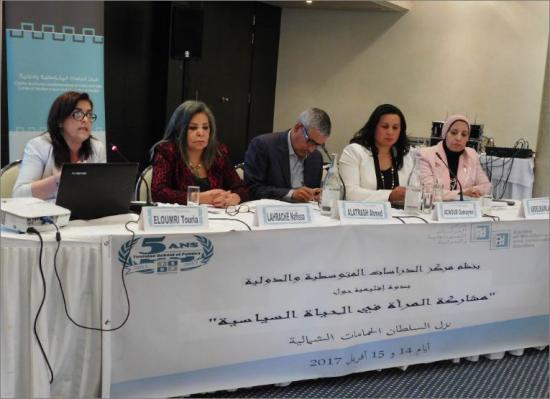
La femme et le leadership au sein des partis politique comme deuxième axe a été soulevé selon des points de vue diversifiés en vue d'assurer et de garantir son inclusion fondamentale dans tous les rangs politiques, en vigueur et en termes réels, comme étant un agent actif et indispensable.
Et finalement, la promotion du rôle de la société civile dans le renforcement de la participation politique des femmes à la vie politique a été placée comme clôture de ce séminaire. Cet axe a mis en relief la contribution de la société civile, largement influente, dans le processus de consolidation et d’affermissement de l’autonomisation politique des femmes.
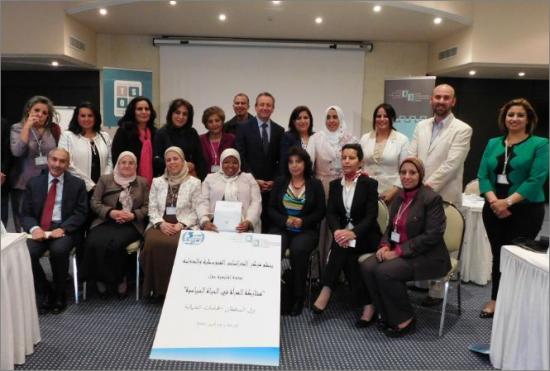
La fin du séminaire n’a pas signifie pour autant la fin de cette activité, étant donné que les invités présents ont estimé que ce séminaire devra être suivi par plusieurs autres semblables.
Nahed Jlaiel - @CEMI
